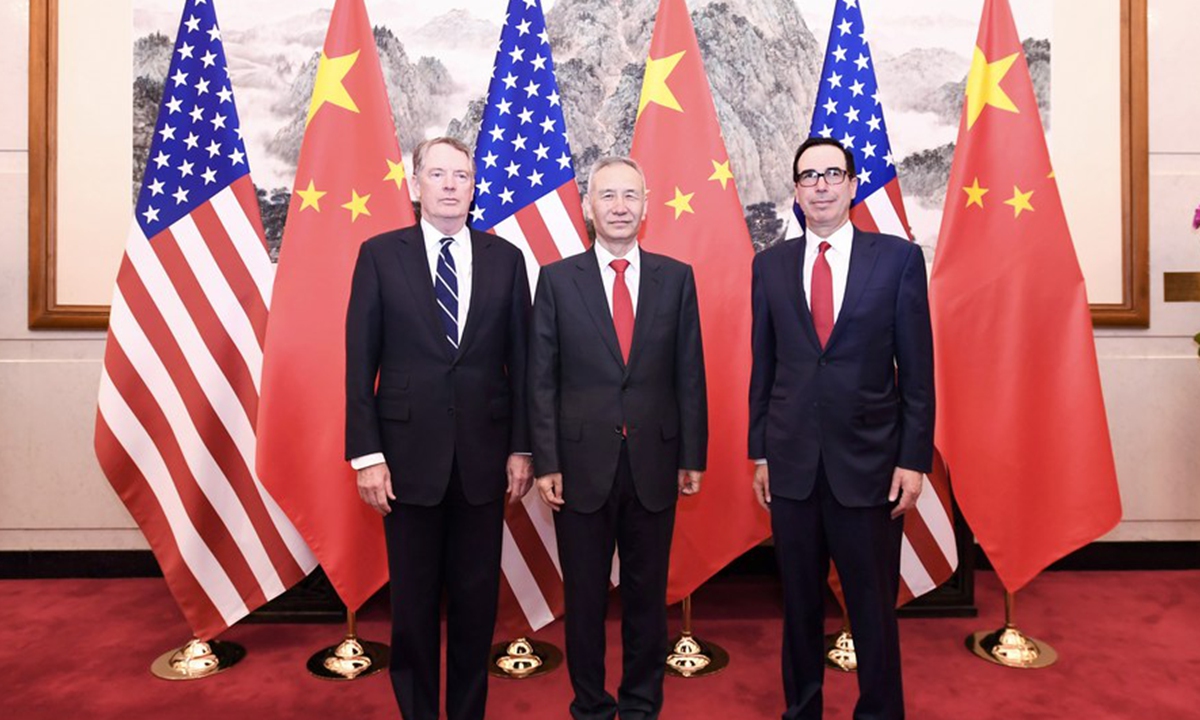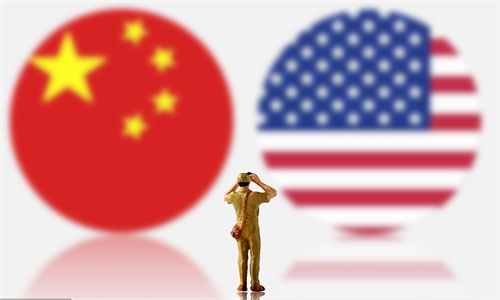
File photo shows Chinese Vice Premier Liu He, US Trade Representative Robert Lighthizer and Treasury Secretary Steven Mnuchin co-hosting the eighth round of China-US high-level economic and trade consultations in Beijing from March 28 to 29, 2019. Photo: Xinhua
Chinese Vice Premier Liu He held a phone conversation with US Trade Representative Robert Lighthizer and Treasury Secretary Steven Mnuchin on Tuesday morning upon invitation. Both sides described the conversation positively in their statements afterward. As previously, the US side touched more upon its concerns, yet its statement confirmed that the phase one deal is being implemented, which is basically being carried out smoothly, and that the US wishes to "ensure the success of the agreement." Neither side used critical language in their statements.
This is a very positive communication between China and the US. It involves the most substantial interests of both countries. Before the talk, there had been quite a lot of extremely unfriendly voices against China, with various threats every now and then in the US. The situation and the call were in sharp contrast, reminding people to observe China-US ties, which are in the midst of turbulence, from more perspectives.
The fundamental adjustment of the US' strategic mind-set over China is real. This has to a large extent reset the China-US relationship. But as the US election approaches, US policy toward China has increasingly involved more grandstanding demands.
It can be expected that in the next two months, the US will step up the frequency of showing a tough attitude toward China to win more support amid the current atmosphere of US public opinion.
However, the Trump administration will have to consider the risks - if a major crisis between China and the US occurs during this period, will the US take the crisis under control to a level which would not negatively impact Trump's approval ratings? This would be a huge gamble.
Against the backdrop of the pandemic, China has become the US' largest trading partner once again, which fully demonstrates that the actual demand for China-US economic and trade cooperation is stronger than bilateral decoupling, which some in the US are clamoring for. Some of Washington's curses on China-US ties are exaggerated, which diverts from the reality of intertwined interests.
Chinese society should be calm. There is too much disruptive information from the outside world. When Washington is increasing its political stunt on its policy toward China, its allies may show an ostensible attitude toward China, clamoring about decoupling or forming an alliance, but with the mixed aim of assuming self importance by connections with the US, trying to flatter the US or raise their own political status.
Once China-US political relations are tense, more trouble will emerge for the two countries. But as long as Beijing and Washington maintain strong economic ties, their political tensions will be reduced. As long as China does not engage in a new cold war with the US and adheres to expanding opening-up, a few US geopolitical fanatics can never completely decouple China and the US.
There are constant claims that the era of China as the world's factory is over. Those who dare to make such false claims overestimate their own judgments.
How can China's high-quality human resources, manufacturing industry and low costs be easily replicated by a small economy and a backward market? China's diversity, its overall economic activity and its status as a mega market are also unique worldwide.
Implementing the phase one trade deal will increase mutual interests. If Trump realizes reelection, it will be harder for him to abandon the deal in the second term than to realize a China-US decoupling when the deal had not been signed. He may encounter greater resistance from Americans. The phase one trade deal will play its role while US strategic hostility against China rises, and will increase the openness of future China-US relations.
China-US relations cannot be redefined by the US alone. China's say is in our own hands, especially on the issue of whether there will be a new cold war between China and the US.

